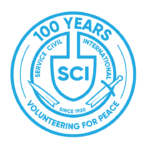Dear all,
We are glad to announce a new SCI- Peace Messengers (PM) online course from 9th of March till 13th of April 2018. Would you like to learn for and about peace? Do you want to start facilitating sessions about peace yourself –offline at workcamps or online-? And to share thoughts about peace with like-minded people from different countries/background? In an informal way you learn the basics of being a peace-messenger during the course. The backbone of the course are weekly skype-meetings at Wednesday 8pm CET (five times, 14th of March till 11th of April) and assignments in between.
Please note that the course is free, but not without obligation, it takes average 4-5 hours time-investment a week, including the skype-meeting.
Below you can find a more detailed outline of the course.
This is a new opportunity for you to be involved! Fill in the following form and send it at the latest Tuesday 6th of March to peacemessengers@gmail.com
Name:
Surname:
Country/SCI Branch:
Role in SCI (if relevant):
email:
skype id:
(short) motivation:
Amitiés
Peace Messengers Network
**
Basically the course is split up in 5 blocks (5 weeks)
week 1:
introduction in peace
introduction with each other
week 2
exploring peace, more in depth:
a) quotes, pictures, songs etc
b) peace on different levels
c) the ‘perfect’ peace-maker: who is that?
week 3
SCI and peace
a) why is a (SCI-)workcamp related to peace
b) values of SCI
week 4
peace-messenger of SCI
a) how to set up a (peace) workshop, (for example at a workcamp)
b) roles and tasks of a peace-,messenger
week 5
a) topic, defined by participants of the course (for example conflict-management, climate justice, gender and peace etc.)
b) evaluation and follow-up
Each week there will be
1) a skype-chat meeting (eg not speaking, but typing) with 8-10 other participants
2) two assignments, an individual one and a pair-assignment, where you will work together on with another participant
Moreover there will be a virtual class-room, where you can discuss with the other participants about any topic related to peace (time-investment up to you).
—
Our vision is a world of peace, social justice and sustainable development, where all people live together with mutual respect and without recourse to any form of violence to solve conflicts.
Our mission is to promote peace and intercultural understanding to empower people to implement and promote pacifist values in their lives.
Peace Messengers are using the non formal education methodology for sessions on workcamps to connect the camps with SCI’s identity as a peace organisation.
_______________________________________________
Sci-announce mailing list
Sci-announce@scimail.org
http://scimail.org/mailman/listinfo/sci-announce_scimail.org


